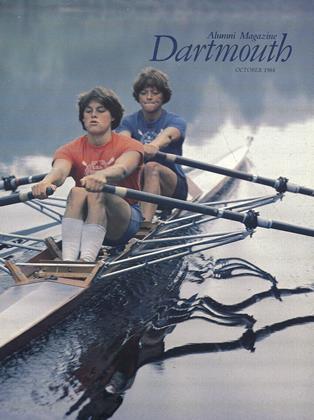In the language of the Sioux, the name "Ohiyesa" means "winner." Ohiyesa was the Indian name of Native American Dr. Charles Alexander Eastman, class of 1887. But he is described by his chronicler as "a winner lost lost between the world of his youth and the world of his white benefactors." After a life of great challenge and achievement he lay for almost 50 years in an unmarked grave in Illinois.
Last June, the Dartmouth Club of Detroit honored Eastman at its monthly luncheon. The guest speaker at the luncheon was Raymond Wilson, author of a biography entitled Ohiyesa Charles Eastman, Santee Sioux. Wilson is a professor at Fort Hays State Univer- sity in Hays, Kans.
In the January/February 1981 issue of the Alumni Magazine, Rob Eshman '82 called Eastman "one of the few effective bridges between red and white in his time." As Ohiyesa, Eastman spent the first 15 years of his life in the Canadian wilderness until his father, a Sioux converted to Christianity, moved him to South Dakota where Eastman began "to learn the wisdom of the white man."
At Dartmouth Eastman excelled at studies and sports. He was captain of the rugby team, a track champion in the two-mile run, and a prize-winning orator. After graduating from Dartmouth, he entered Boston University Medical School and graduated in 1890. That year the U.S. government appointed him as the reservation physician at the Pine Ridge Reservation in South Dakota. He was there during the Sioux wars that led to the Battle of Wounded Knee; in the aftermath, he treated the injuries of both Indians and cavalrymen.
Eastman later moved to St. Paul, Minn., where he opened a private practice and became a national YMCA representative, organizing some 43 new YMCA chapters around the country. In 1897 he went to Washington, D.C., to lobby for Indian rights. Later, he returned to public service as a government physician in the Indian Service and published sevferal books and articles on Native American health and education and on the traditional religion and folklore of the Sioux. He was appointed U.S. Indian Inspector by President Coolidge. An international committee chose Eastman to represent the American Indian at the First Universal Races Congress in London in 1911. He returned to England in 1927 to lecture at Ox- ford, Cambridge, and other British universities.
In the United States, he and his family established two summer camps on Granite Lake in New Hampshire. The YMCA camp near Holly, Mich., was named Camp Ohiyesa in his honor.
Dr. Eastman died in Detroit in 1939 and was buried in an unmarked grave in Evergreen Cemetery. When Professor Wilson advised the College of this, the Dartmouth Club of Detroit and Wilson began making arrangements for a tombstone. At a ceremony following the June luncheon, Professor Wilson and alumni representing classes from 1929 to 1983 were present at the unveiling of the tombstone, which read: "Charles A.Eastman/
' OHIYESA 71858-1939/ Physician, Author, Reformer/Dartmouth Club of Detroit 1984."
Last ]une members of the Dartmouth Club of Detroit and their guests gathered at the grave of NativeAmerican Dr. Charles Eastman, class of 1887, for the unveiling of a tombstone presented by the club.
 View Full Issue
View Full Issue
More From This Issue
-
 Feature
FeatureThe Class of 1930 Room Public Service Wall
October 1984 By Charles E. Widmayer '30 -
 Cover Story
Cover StoryGeared for Success
October 1984 By Jim Kenyon -
 Feature
Feature"Little Joe" Wentworth, 1900: Scholar, Athlete, Gentleman
October 1984 By John F. Anderson '34 -
 Feature
Feature"The Computer Revolution" Revisited
October 1984 By George O'Connell -
 Article
ArticleA Post-game Peregrination
October 1984 By Dana Cook Grossman -
 Article
ArticleGetting Better with Age
October 1984 By Gayle Gilman '85
T. A.
Article
-
 Article
Article... and the Alumni College
OCTOBER 1964 -
 Article
ArticleThe Campaign for Dartmouth: A Final Note
DECEMBER 1983 -
 Article
ArticleFrom Dealmaker to Rehabber
April 2000 -
 Article
ArticleCornell 13, Dartmouth 7
December 1952 By Cliff Jordan '45 -
 Article
ArticleGRADUS AD PARNASSUM
November 1941 By The Editor -
 Article
ArticleSeattle
MARCH 1969 By THOMAS B. RUSSELL '61



